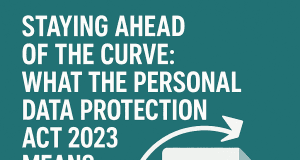The General Data Protection Regulation (GDPR), effective since May 2018, continues to shape the landscape of digital marketing. As businesses strive to navigate the complexities of this regulation, the transition from mere consent to full compliance is paramount for modern marketing strategies. This article explores how organizations can effectively update their marketing approaches in line with GDPR requirements, ensuring that they not only meet legal obligations but also foster consumer trust.
Understanding GDPR
GDPR is a comprehensive set of regulations that governs data protection and privacy in the European Union (EU) and the European Economic Area (EEA). It emphasizes the rights of individuals over their personal data, requiring businesses to handle this information transparently and securely.
Key Principles of GDPR
- Lawfulness, Fairness, and Transparency: Organizations must process personal data lawfully and provide clear information about how data is used.
- Purpose Limitation: Data must be collected for specific, legitimate purposes and not processed in a manner incompatible with those purposes.
- Data Minimization: Companies should only collect data that is necessary for their stated purposes.
- Accuracy: Organizations are responsible for ensuring that personal data is accurate and kept up to date.
- Storage Limitation: Personal data should not be retained longer than necessary for its intended purpose.
- Integrity and Confidentiality: Data must be processed securely to protect against unauthorized or unlawful processing.
- Accountability: Businesses must be able to demonstrate compliance with GDPR principles.
Shifting from Consent to Compliance
1. Rethinking Consent
While obtaining consent remains critical, GDPR mandates that it must be informed, specific, and unambiguous. Businesses should:
- Use Clear Language: Avoid legal jargon. Provide straightforward explanations of data usage and processing activities in consent forms.
- Implement Granular Consent Options: Allow consumers to provide consent for specific data usages rather than a blanket agreement.
- Offer Easy Withdrawal Options: Make it simple for users to withdraw consent at any time, reinforcing transparency.
2. Data Mapping and Inventory
To adhere to GDPR guidelines, it’s essential to:
- Conduct Data Audits: Identify what personal data you collect, how it’s processed, and where it’s stored.
- Document Data Flows: Maintain comprehensive records of data sources and processing activities to demonstrate accountability.
3. Enhance Data Security Measures
GDPR requires businesses to implement robust security measures to protect personal data.
- Adopt Encryption: Encrypt sensitive data both at rest and in transit to mitigate risks of data breaches.
- Secure Third-Party Vendors: Ensure that any third-party services you utilize for marketing compliance also adhere to GDPR standards.
- Regular Security Assessments: Schedule regular audits and assessments to identify vulnerabilities and ensure compliance.
4. Create a Transparent Privacy Policy
Your privacy policy must be easily accessible, written in clear language, and updated regularly. Include:
- Data Usage: Clearly outline how personal data will be collected, used, and shared in marketing efforts.
- User Rights: Inform users of their rights under GDPR, including access, rectification, and erasure of their data.
5. Shift to Preference-Based Marketing
Instead of traditional marketing tactics that often rely on volume, focus on quality interactions.
- Personalize Engagements: Use data insights to tailor content and offers, enhancing user experience while adhering to consent requirements.
- Leverage Customer Feedback: Actively solicit input from customers on their data preferences, using this feedback to fine-tune marketing strategies.
6. Train Your Team
Comprehensive training is vital for compliance. Ensure that:
- All departments are involved: Engage marketing, IT, and legal teams to foster a culture of data protection across the organization.
- Continuous Learning: Keep your staff updated on the latest GDPR developments and best practices.
Conclusion: The Path Forward
As businesses continue to adapt to GDPR, the shift from merely obtaining consent to ensuring comprehensive compliance will enhance not only legal standing but also consumer trust. By prioritizing transparency, security, and accountability, organizations can develop marketing strategies that resonate with customers while respecting their data privacy.
In a landscape where consumer awareness around data protection is rising, compliance becomes a competitive advantage. By investing in compliance strategies now, organizations can lay the groundwork for sustainable growth and lasting customer relationships in the future.









